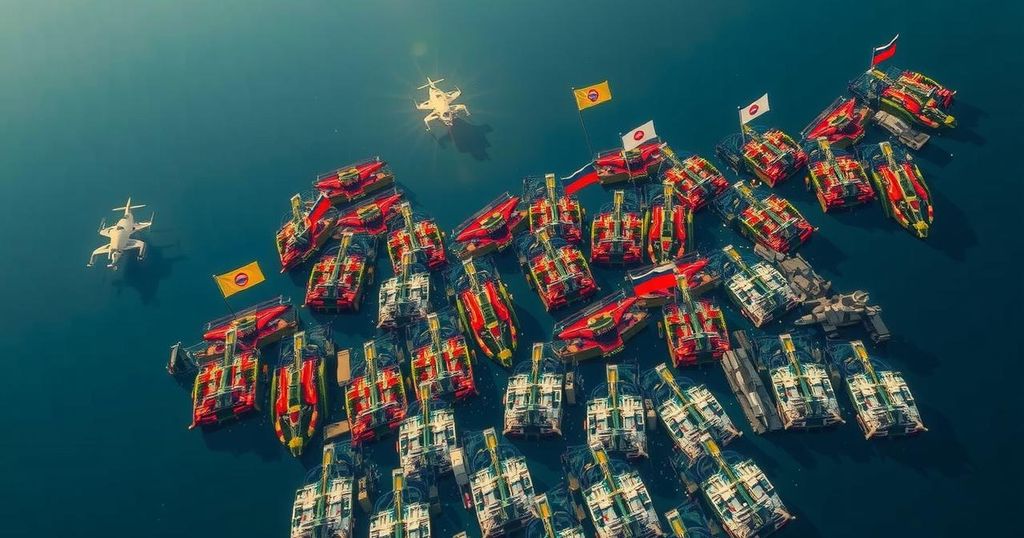China’s Diplomatic Balancing Act Amid North Korea’s Troop Deployment to Russia
Recent deployments of North Korean troops to the front lines in Ukraine have prompted calls from leading global partners for China to intervene. Xi Jinping faces significant diplomatic pressure to manage the implications of these military actions while navigating his relationships with Russia and the West. As tensions rise, the delicate balance China must maintain raises concerns regarding regional stability and the potential escalation of conflicts.
The deployment of over 10,000 North Korean troops to Russia amidst the ongoing conflict in Ukraine has created a precarious situation for China, as multiple trading partners urge President Xi Jinping to pressure Pyongyang to reverse this decision. Such requests were emphasized during recent summits in Brazil and Peru, revealing the complexities of China’s diplomatic balancing between Russia’s support and Western opposition. Xi Jinping has called for peace in Ukraine, maintaining a delicate diplomatic stance while facing increasing pressure from global leaders, including U.S. President Biden and South Korean President Yoon Suk Yeol, to act against North Korea’s military engagement with Russia.
The geopolitical implications of North Korea’s troop mobilization are significant, with potential escalations in the conflict highlighted by leaders from Germany and South Korea. This situation places China in a difficult position; while it values its alliance with North Korea, it is wary of the consequences of military cooperation between North Korea and Russia that could destabilize the region and provoke further tensions with the West. Patricia Kim from the Brookings Institution notes that China is disturbed by the implications of North Korea’s actions, particularly as they can incite security risks for Beijing itself.
Although there is an awareness among Chinese officials regarding the possible repercussions of increased North Korean military involvement in Russia’s war effort, Xi is unlikely to confront Pyongyang directly. Analysts suggest that China feels its broader relationship with Russia outweighs concerns over military collaborations with North Korea. Previously, the U.S. has sanctioned Chinese firms for assisting Russia, reflecting the pressure on Beijing to navigate these complex diplomatic waters cautiously.
As noted by Richard Weitz from the Hudson Institute, China prioritizes its relationship with Russia over any specific disagreements regarding North Korea, signifying a unified stance against the U.S. and its allies. While it has refrained from overtly condemning the Russia-North Korea partnership, experts believe that Beijing understands this collaboration may not align with its security interests.
Thus, the ongoing developments surrounding North Korea’s troop deployment to Russia present an intricate diplomatic challenge for China, as it strives to maintain its relationships with both Moscow and Pyongyang while addressing the concerns of its Western counterparts.
The geopolitical landscape has shifted significantly with North Korea’s engagement in the conflict in Ukraine, where more than 10,000 of its troops have allegedly been deployed to fight alongside Russian forces. This situation has raised concerns globally, particularly among China’s key trading partners, who are seeking a more assertive stance from China to manage North Korea’s military actions. As the Chinese government strives to balance its allegiance to Russia with its economic ties to the West, it faces increasing pressures to influence Pyongyang’s decisions and curtail potential escalation in the conflict.
In summary, the situation surrounding North Korea’s troop deployment to Russia complicates China’s foreign policy, as it grapples with the pressures of its international relationships. The appeals from international leaders for China to act demonstrate the urgency of addressing the potential consequences of North Korea’s military actions. Ultimately, while China continues to navigate its diplomatic stance with caution, its historical ties with North Korea and mutual interests with Russia complicate any potential intervention. The outcomes of this balancing act will likely impact regional stability and international relations in the coming months.
Original Source: www.voanews.com




Post Comment